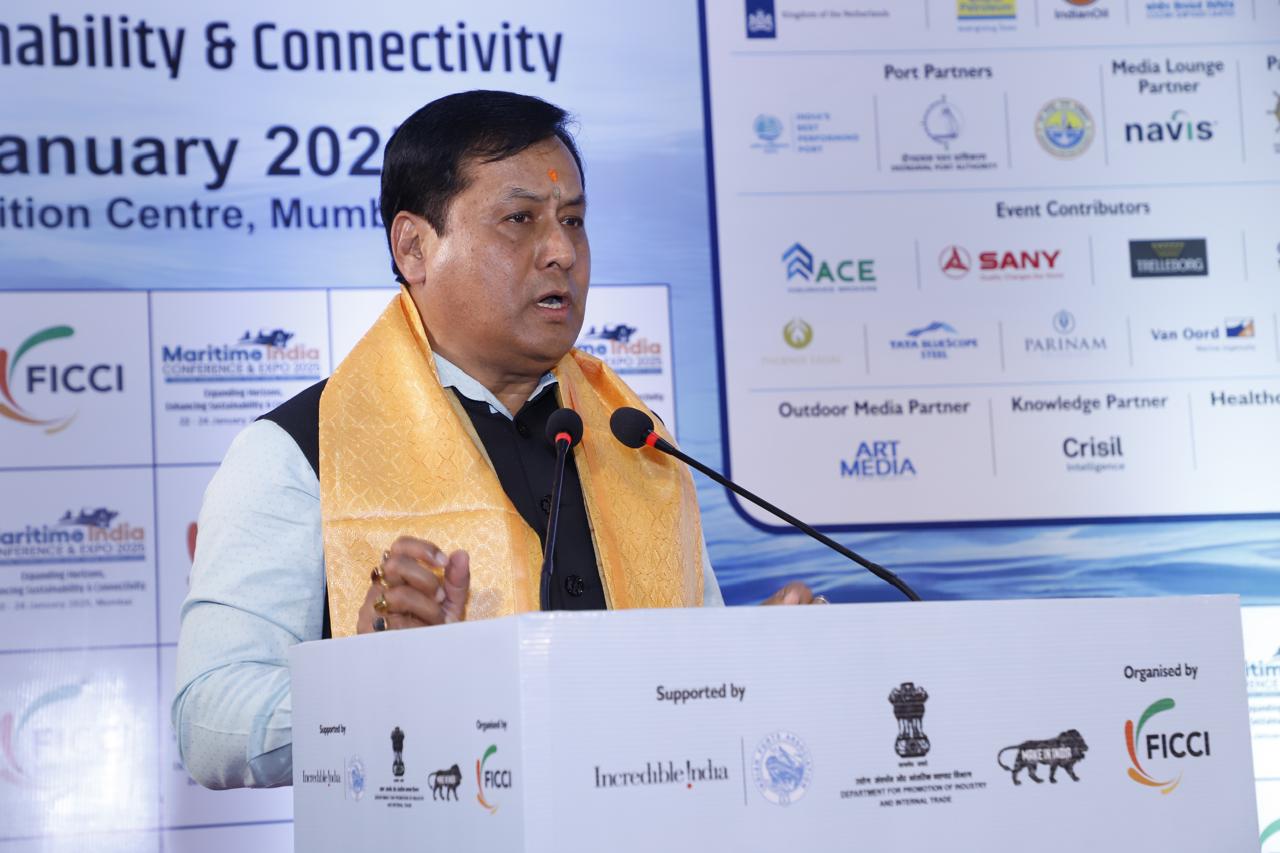
India’s maritime sector has become a cornerstone of the country’s economic resurgence : Sarbananda Sonowal
MUMBAI : India is expanding its port capacity more than sixfold to reach 10,000 million tonnes per annum by 2047, marking the country’s largest-ever maritime infrastructure drive as it positions itself as a global shipping hub.
Speaking at the FICCI Maritime Conference and Expo 2025, Union Minister for Ports, Shipping and Waterways, Shri Sarbananda Sonowal revealed that major ports are already handling 820 MMT of cargo annually, representing a 47 per cent increase since 2014, while overall port capacity has doubled to 1,630 MMT during the same period. “India’s maritime sector has become a cornerstone of the country’s economic resurgence,” he said.
The expansion programme includes the development of two strategic mega-ports: the Vadhavan Port in Maharashtra, set to become India’s largest container facility, and the International Container Transshipment Port at Galathea Bay in Great Nicobar, aimed at capturing transhipment trade along key global routes.
“These achievements epitomise our vision of Ports for Prosperity, where infrastructure serves as a springboard for economic growth and job creation,” said the Minister.
The maritime modernisation drive has already yielded significant efficiency gains. Container dwell time has been reduced to three days, while vessel turnaround time has improved to 0.9 days, surpassing several advanced economies. Nine Indian ports now feature in the World Bank’s Container Port Performance Index 2023, with Visakhapatnam ranking among the top 20 globally.
On occasion, Shri T K Ramachandran, Secretary of the Ministry of Ports, Shipping & Waterways,noted India’s maritime sector is targeting $1 trillion in investments by 2047, with immediate plans for green hydrogen production hubs at major ports.
The Secretary revealed that several companies have already leased 4,000 acres for green hydrogen facilities at the ports of Kandla, Tuticorin, and Paradip, with production expected to commence within a year.
“Half a dozen companies have come forward to invest in these places,” Mr Ramachandran said and added, “We expect about 5 lakh crores in investments by 2030.”
In addition, Mr Ramachandran alluded to the Hong Kong Convention on ship recycling, which takes effect in June, highlighting that the government expects Indian shipyards to benefit from it. Most recycling yards in Alang already comply with the convention’s standards, positioning India to capture a larger share of the global ship recycling market, he noted.
The Dutch Consul General Mr Nabil Taouati highlighted deepening bilateral ties in sustainable ports, logistics, and maritime security. As India pursues its ambitious target of 10,000 MTPA port capacity by 2047, the Netherlands – currently the fourth-largest source of FDI in India – is positioning itself as a key partner in port development. Taouati emphasised shared interests in supply chain optimisation, port decarbonisation, and cyber resilience, underscoring a partnership that extends beyond maritime infrastructure to encompass energy transition, sustainable food production, and healthcare initiatives.
Shri Shyam Jagannathan, Director General of the Directorate of Shipping, underlined India’s maritime sector is undergoing a transformative expansion, with ambitious targets to reshape its global standing across multiple segments. Currently ranked second globally in ship recycling, 18th in shipbuilding, and third in seafarer contributions with over 300,000 personnel, India aims to lead the ship recycling sector, break into the top five shipbuilding nations, and provide more than 20% of the global seafaring workforce.
Despite India’s maritime sector standing at “the threshold of unprecedented growth,” significant challenges must be addressed to realise its full potential. Mr Subba Rao, Managing Director, Sanmar Shipping, underscored that while India’s shipbuilding industry has a unique opportunity to become a global hub by building new infrastructure “from scratch” rather than upgrading existing facilities, it faces pressing challenges in skilled labour availability and sustainable fuel adoption. He highlighted the dual challenges of transitioning to net-zero emissions while addressing critical skill gaps in shipbuilding and repairs, calling for increased industry collaboration and investment in both infrastructure and workforce development.
During the conference, the Union Minister also unveiled the FICCI-CRISIL Knowledge Report on ‘Forging New Horizons: The Growth of India’s Shipbuilding and Repair Industry’, the report provides highlights of the journey of the global and Indian shipbuilding markets, the factors driving growth and how India holds the potential to become a leading hub for shipbuilding and repair.
The conference and exhibition, which will continue over the next two days, will see more than 100 exhibitors, 50-plus speakers, 7500 visitors and representation from more than 10 countries. Major organisations, which include J M Baxi, D P World, JSW Infrastructure, Essar Ports, Marine Electricals, Deendayal Port Authority, New Mangalore Port Authority, Maharashtra Maritime Board, Andhra Pradesh Maritime Board, Jawaharlal Nehru Port Authority, Cochin Shipyard Bharat Petroleum, Indian Oil, among others, are participating in the exhibition. Andhra Pradesh is the partner state.
The conference is being organised in association with the Indian Ports Association.
